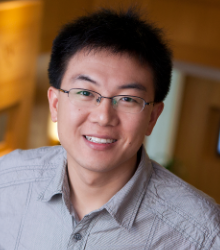报告题目:Synthetic Biology for Advanced Chemicals and Materials
报 告 人:Fuzhong Zhang教授 美国圣路易斯华盛顿大学(Washington University in St. Louis)
报告时间:2020年5月7日 周四上午9:00-10:00 am
报告在线地址:腾讯会议(会议ID: 498 893 083)

报告摘要:
Advances in synthetic biology have enabled the quantitative engineering of biological processes for the production of various chemicals and materials. In this presentation, I will discuss recently published work from my research group in the efforts of engineering microbes to produce non-common chemicals derived from engineered fatty acid pathways, including terminally-branched fatty acids, branched fatty alcohols, ω-hydroxyl fatty acids, and dicarboxylic acids. In addition, my group has developed multiple synthetic biology approaches for the microbial production of protein-based materials with defined structures and tunable properties. These biosynthetic strategies were applied to the microbial production of high-performance protein fibers, resulting in synthetic spider proteins with molecular weight reaching 556 kDa and synthetic fibers fully replicate the mechanical performance of natural spider silk by all common metrics, i.e. tensile strength (1.03 ± 0.11 GPa) and toughness (114 ± 51 MJ/m3). These developed strategies will provide numerous novel materials with high-performance and tailored properties, enabling a broad range of new applications.
报告人简介:
Fuzhong Zhang is the Francis Ahmann Career Development Associate Professor in the Department of Energy, Environmental & Chemical Engineering, Washington University in St. Louis. He received his bachelor degree at Peking University, master at McMaster University, Ph.D at University of Toronto, and postdoctoral training at UC Berkeley/Joint BioEnergy Institute. His research focuses on developing synthetic biology tools and systems for the sustainable production of structurally-defined chemicals and high-performance materials. Since he joined Washington University in 2012, he has received numerous awards, including DARPA Young Faculty Award (2013), ORAU Junior Faculty Enhancement Award (2013), NSF CAREER Award (2014), Young Investigator Program from AFOSR, ONR, and HFSP (2015), NASA Early Career Faculty Award (2015), Biotech & Bioeng Daniel Wang Award (2016), Dean’s Faculty Award for Innovation in Research (2016), the SIMB Young Investigator Award (2017), and NIH Maximizing Investigators' Research Award (2019).